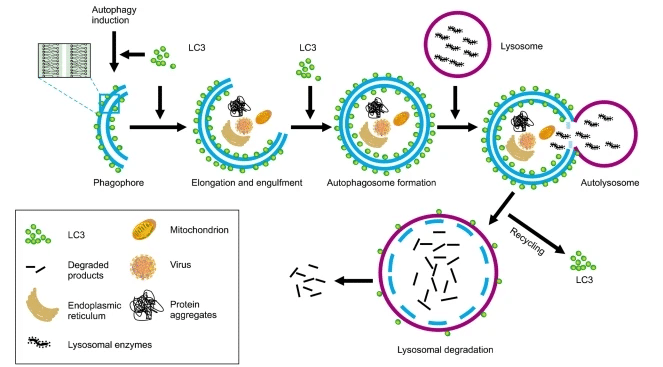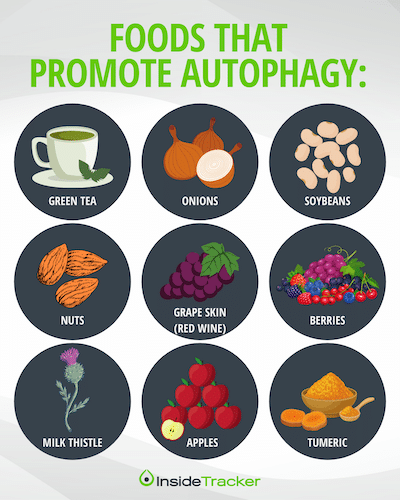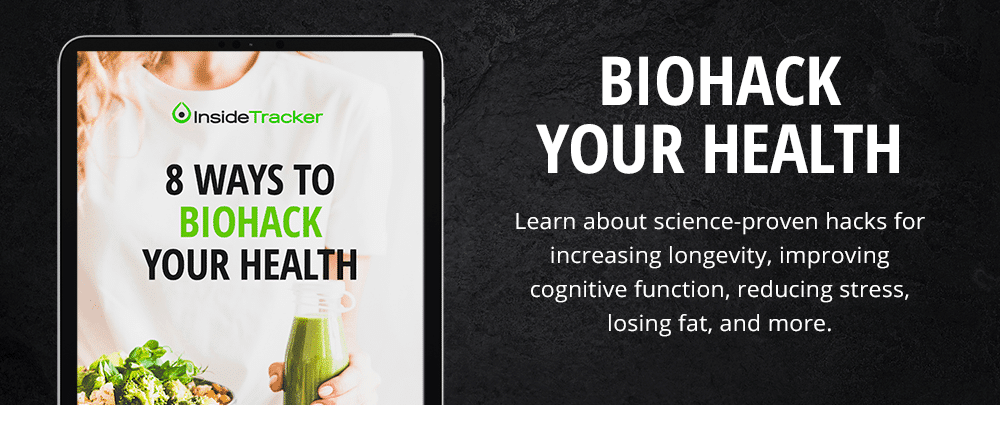Our cells go through a normal, physiological mechanism in which they quite literally feed on themselves—a process known as autophagy (pronounced aa-TAA-fuh-jee). The word autophagy stems from the Greek prefixes auto- (self) and -phagy (feed on). This form of cellular housekeeping allows our body to remove damaged parts of cells while recycling others. Inducing autophagy, especially through extended fasts, has become a popular habit among the longevity and biohacking crowds as a way to improve healthspan and live longer. But is this safe? How long is too long of an extended fast? Where does the current literature stand in humans? In this article, we dive into the popular (but still relatively uncharted) field of autophagy.
What is autophagy?
Autophagy is a form of cellular housekeeping where misfolded proteins, damaged organelles, and pathogens are degraded and removed from cells. As seen in the diagram below, as the process of autophagy begins, a structure (or autophagosome) starts to form. Once fully enclosed, the autophagosome fuses with a lysosome—an organelle containing enzymes that can degrade and destroy molecules. The fusion of both organelles creates an autolysosome, where the degradation of cellular parts occurs. Other parts are recycled and reused for cellular repair.[1]

Figure 1. The process of autophagy. Reprinted from Jing, K., Lim, K. Why is autophagy important in human diseases?. Exp Mol Med 44, 69–72 (2012). https://doi.org/10.3858/emm.2012.44.2.028
Autophagy plays a vital role in the homeostasis of cellular health, as the outcome leads to healthier cells and the death and clearance of damaged and dysfunctional ones. Autophagy plays a critical role in many areas of health, including the prevention of numerous diseases like cancer, diabetes, autoimmune disorders, infections, and neurodegenerative and cardiovascular diseases. Like many physiological processes in the body, autophagy declines with age, but various animal and cell studies indicate that increased activation of autophagy may lead to improved longevity and a longer lifespan.[2-3]
Is autophagy good or bad?
The dysregulation of autophagy—too little or too much—can be harmful and lead to abnormal cell growth or cell death. For example, halting autophagy for an extended period can impact cell growth and lead to several disorders, including tumor formation. On the contrary, overstimulation of autophagy in tumor cells allows them to survive under stressful conditions like chemotherapy and hypoxia.[2] Based on the current research, there are safe and practical ways to induce autophagy to a helpful degree and improve the health of our cells and organs.[2-3] But like many topics in the field of longevity—more research in humans is needed to fully understand the outcomes of induced autophagy.
How do you induce autophagy?
Autophagy can be induced by various stress conditions, including calorie restriction (CR), fasting, and exercise.[2] Certain foods and medications can also stimulate autophagy through different mechanisms.[2-3] Calorie restriction, generally a 10-40% reduction in overall caloric intake, is among the most potent autophagy inducers. Clinical research indicates that long-term calorie restriction (3-15 years) leads to an increased expression of autophagy genes and higher levels of molecules involved in removing dysfunctional proteins and organelles.[4] It’s widely accepted that both CR and fasting may lead to improved health and longevity, and autophagy likely plays a key role in this.
Figure 2. Changes in autophagy gene expression during eTRF.
Both intermittent fasting and extended fasting also lead to an increase in autophagy activity. In a 2019 crossover study, researchers analyzed numerous markers related to longevity, including the expression of autophagy genes. A group of 11 overweight adults followed an early time-restricted feeding (eTRF) schedule and a normal eating schedule. The eTRF schedule resulted in improved longevity outcomes, including a 22% increase in the production of the autophagy gene LC3A after just four days. A handful of human studies also show extended fasts lead to increased autophagic activity through various mechanisms.[5-7]
Exercise also induces autophagy in muscle tissue[8-10]. Autophagy markers immediately increase after short bouts of intense exercise and also over the course of longer moderate-intensity training sessions.[8,10] Some researchers have sought to determine whether exercising after an extended fast may result in greater autophagy activation. However, one study found that exercise intensity was more powerful at inducing autophagy, independent of whether fasting was involved [9].
How long do you need to fast for autophagy?
The current evidence suggests that anywhere between 18 hours (as evidenced by the eTFR study) to four days will trigger autophagy.[5-7] However, only a handful of studies measuring fasting and autophagy exist in humans. As mentioned above, intermittent fasting, calorie restriction, and exercise are all ways to boost autophagy that don’t involve fasting for several days.
What foods inhibit autophagy?
Interestingly, protein-based beverages may decrease autophagy activity. In a randomized control crossover trial, eight males were administered different protein/carb beverages after completing a 36-hour fast. A marker of autophagy activity (LC3II/LC3I ratio) was measured during the fasting vs. the non-fasting periods. A decrease in autophagy occurred when the men sipped on the protein-rich beverages (leucine-rich whey- or soy-based protein) but not the carbohydrate-rich ones. The researchers noted that these findings align with rodent studies where branched-chain amino acids tend to suppress autophagy during catabolic conditions (like fasting). Glucose, on the other hand, does not impact autophagy.[7]
Does coffee stop autophagy?
Current research suggests that coffee does not stop autophagy. Research done in mice indicates that coffee actually stimulates autophagy in several tissues.[11]

Foods that promote autophagy
Lately, recent studies demonstrate that polyphenols, beneficial compounds found in plants, may play a role in inducing autophagy. Polyphenols stimulate various pathways, which can lead to autophagy and a longer lifespan.[3] For example, resveratrol is a common autophagy inducer found in grape skins and nuts. Other polyphenols include quercetin, green tea catechins, and curcumin. The following foods contain polyphenols that promote autophagy:
- Green tea
- Grape skin (red wine)
- Nuts
- Onions
- Apples
- Berries
- Turmeric
- Soybeans
- Milk thistle
A summary of what we know about autophagy:
- Autophagy is a form of cellular housekeeping in which misfolded proteins, damaged organelles, and pathogens are degraded and removed from cells.
- Autophagy plays a critical role in many areas of health, and like many physiological processes in the body, autophagy declines with age.
- Calorie restriction, fasting, and exercise are all potent inducers of autophagy.
- Polyphenols, beneficial compounds found in plants, may also play a role in inducing autophagy.
- Only a handful of studies measuring fasting and autophagy exist in humans. More research is needed to fully understand the benefits and implications of autophagy.
Get the guide HERE.
Diana Licalzi, MS, RD
Diana is a Team Nutritionist at InsideTracker. As a Registered Dietitian and self-proclaimed “biohacker,” Diana enjoys researching and testing the latest trends and technology in the field of nutrition and aging. You’ll often find Diana completing a 24-hour fast, conducting self-experiments, or uncovering strategies to increase longevity. Follow her on Instagram at @dietitian.diana




